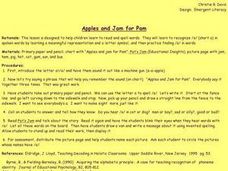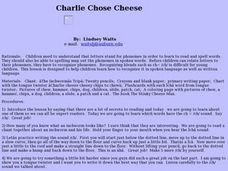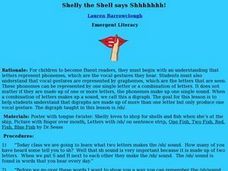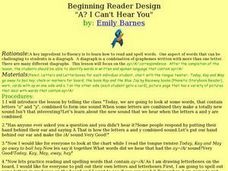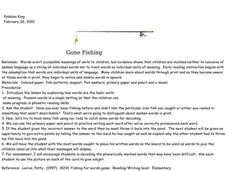Curated OER
Ah Ah Ah! Don't Do That!
Young scholars become familiar with the alphabetic principle that letters stand for phonemes and spellings map out the phonemes in spoken words. They focus on identifying the short /o/ sound in spoken words and the tongue twister "Oscar...
Curated OER
Icky, Icky, Sticky!
Learners explore phonemes in spoken words as well as their corresponding graphemes in written words. They practice the short vowels /i/ and /e/. Students perform activities to practice sounds. They identify pictures with a particular...
Curated OER
Build Fluency /A/
Students are introduced to the letter "A" and play a game to reinforce the printed and sound recognition of the letter "A." In this letter "A" lesson, students observe the teacher model the letter card game. Students participate in...
Curated OER
Tricky T
Students practice the corresponding phonemes associated with the letter and sound symbol to T. They identify the letter, write it and also identify pictures that display it's beginning sound. Students also interact with the book,...
Curated OER
Apples and Jam for Pam
Students study the /a/ phoneme in written and spoken words by making the sound and identifying it in words. They repeat a phrase three times and write lower case a's on primary paper. Next, they listen to "Pat's Jam" and blink their eyes...
Curated OER
Ta-Ta- Timer
Students identify a letter of the alphabet. They recognize this letter in print and in spoken language. The letter and phoneme chosen is the letter t and /t/. They write the letter in both lower and upper case. They read 'One Tiny...
Curated OER
Doct or Help! This /i/ is ITCHING!
Students recognize the short /i/ sound in written and spoken words. They say a tongue twister which emphasizes words with the short /i/ sound. They then listen to the story "Liz is Six" and identify the words in the story with the...
Curated OER
Shelly Shark Goes Shopping
Students identify the digraph /sh/ in written and spoken language. Students practice the production of the /sh/ sound through words and tongue twisters. They identify the initial and final placement of the new digraph /sh/ through...
Curated OER
Charlie Chose Cheese
First graders identify the digraphs in written and spoken language. After a brief discussion of the combinations of /c/ and /h/ that comprise th /ch/ digraph, 1st graders practice identifying initial and final placement of the digraph...
Curated OER
Shelly the Shell
First graders identify the digraph /sh/ in written and spoken language. Students practice the production of the /sh/ sound through word practice and stories. They identify the initial and final placement of the new digraph /sh/ using a...
Curated OER
Don't Make that Baby Cry
Learners study the short "a" sound in words by examining the mouth movements made when making the sound. They practice making the sound by pretending they are making baby sounds. Next, they recite a tongue twister that contains a number...
Curated OER
SSSneaky SSSSnake
Students identify words that contain the s sound - comparing the sound to a hissing snake. They say a tongue twister with words emphasizing the s sound. They then practice writing s's, and listen for the s sounds in words the teacher...
Curated OER
Open Wide at the Dentist, "Aaaahh"
Study the /o/ in both written and spoken words by reciting a tongue twister and making words using Elkonin letterboxes. Next, write a message about frogs using /o/ words. Finally, listen to a short book talk on "Doc in the Fog" before...
Curated OER
Duh!
Students practice discerning between the letters and sounds for the lower case letters b and d. Through practice activities, they recognize the difference between the commonly confused letters b and d. They practice writing both letters...
Curated OER
Chocolate Chicken
Students identify digraphs in written and spoken language. After a brief discussion on the combinations of letters that comprise digraphs, students practice identifying initial and final placement of the digraph /ch/ in words and tongue...
Curated OER
Shhhhhh the Baby is Sleeping
First graders identify the digraph /sh/ in written and spoken language. Students practice the production of the /sh/ sound through word practice and riddles. They identify the initial and final placement of the new digraph /sh/ using a...
Curated OER
Shhh
Students identify the digraph /sh/ in written and spoken language. Students practice the production of the /sh/ sound through storiesand tongue twisters. They identify the initial and final placement of the new digraph /sh/ using a...
Curated OER
A? I Can't Hear You
Young scholars identify the digraphs in written and spoken language. After a brief discussion on the combinations of letters that comprise digraphs, students practice a tongue twister containing the digraph ay. They identify the...
Curated OER
Gone Fishing
Young scholars practice decoding words phonetically. The teacher discusses the association between spoken and written language. After the discussion, each student is given a word that is spelled phonetically. They decode the word by...
Curated OER
"Mmmm... Yummy to My Tummy!"
Students answer a series of question about different letter sounds. They verbally practice the sounds of each letter following set responses. They write the different letters and find words that start with that letter.
Curated OER
Allie the Rat
Students identify the letter a and the short vowel sound it makes. They do a tongue twister with the sound in it and write what the letter a looks like on primary paper. Students have to listen to or read a story called Pat's Jam and...
Curated OER
Fish Wish
Students identify the digraph /sh/ in written and spoken language. After a reading of a decodable story containing the digraph, students practice identifying the initial and final placement of the new digraph /sh/ in words using a...
Curated OER
Choo Choo Train
Students identify the digraphs in written and spoken language. After a brief discussion of the combinations of /c/ and /h/ that comprise th /ch/ digraph, students practice identifying initial and final placement of the digraph /ch/ in...
Curated OER
O No!
First graders distinguish between short vowel a and long vowel O. They are introduced to the vowel-consonant-e pattern that changes short vowel sounds into long vowel sounds. They practice spelling words with the vowel-consonant-e pattern.






